

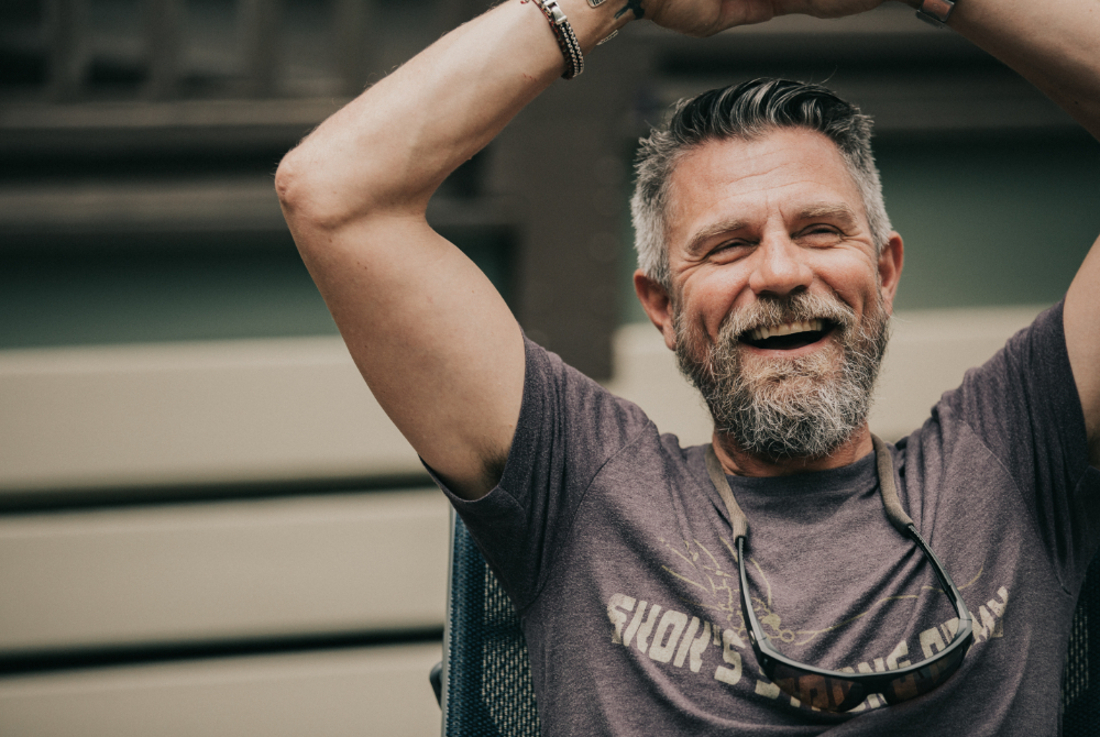
As I pull up outside his Santa Rosa Beach, Florida home he is already waiting outside.
I expected a game fishing legend to be a big, salty bear of a man, shaggy beard, sunburnt nose and lips, sports sunglasses on and bedecked in those PFG vented shirts and shorts I’d seen so many times before.
Instead, I’m warmly, but warily, welcomed by David Mangum dressed in a simple t-shirt and shorts and wearing uber-fashionista Havaianas flip-flops. He is slim but toned, dark hair, greying a little at the temple and with a well-kempt beard, he could have been a yoga instructor, a musician, or a tennis pro.
This being during the COVID-19 crisis, we decline to shake hands or bump elbows and he leads me through to the decked backyard where we are going to talk. There, in anticipation, he has set out three chairs each ‘socially distanced’ almost exactly 6 feet apart. I move one of the chairs slightly so I can arrange my notes and recording devices and I see his eyes dart back and forth recalibrating the distances.
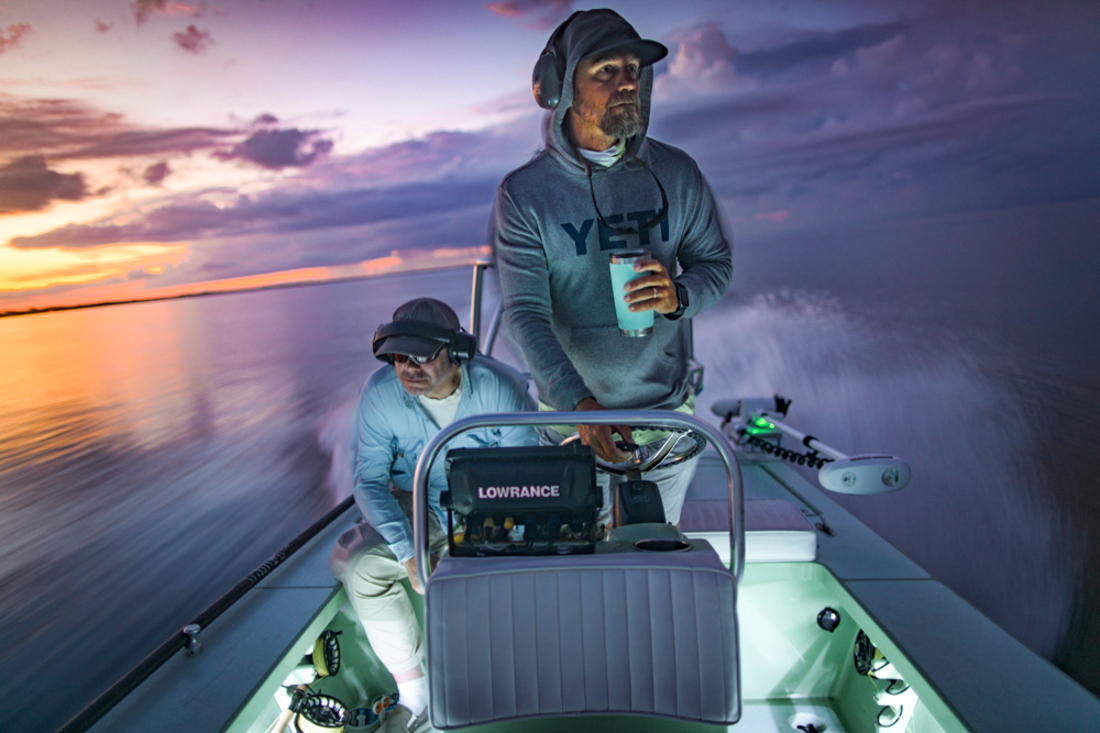
Photo Credit: Lauren Athalia
David Mangum is recognized as one of the nation’s elite Tarpon fishing guides and has been at the top of his game for more than two decades. His is a story of how an obsession for being the very best, a commitment to doing the right thing, and respect for one of the most exotic of the game fish combine.
Born in Northwest Florida, David grew up fishing and boating on its emerald green waters. While fishing was always a passion, he had other interests too, playing State championship soccer, dabbling with art. He is now an accomplished painter, in oils, and with a brief stint at military school to, in his words, ‘straighten me out a little.’ He graduated high school in Fort Walton Beach, Florida.
He tells me his first experience with Tarpon was on a fishing trip with his father: “I was young, really young. We were in our Jon boat, which we still have, and we were under the Destin bridge and my Dad was doing something on his side of the boat, and on this side I saw what looked to me like a scaled serpent. You know the old paintings of serpents in the sea. The Tarpon do this thing where they come up and grab air from the surface—it’s called rolling. At the time I had no idea what it was, and I swore to my Dad for years that I saw a sea serpent. It was a long time after, I realized that it was three tarpons rolling together.”
Post school, he applied for fishing camp and guide jobs in Alaska, similar opportunities took him to Colorado, Texas, the Bahamas and Puerto Rico. Back in Northwest Florida, working bar and restaurant jobs, David spent every spare hour out on the water looking for Tarpon, but unlike his fellow fishing friends, he was also taking careful note of the tides, the weather, and the way the fish behaved.
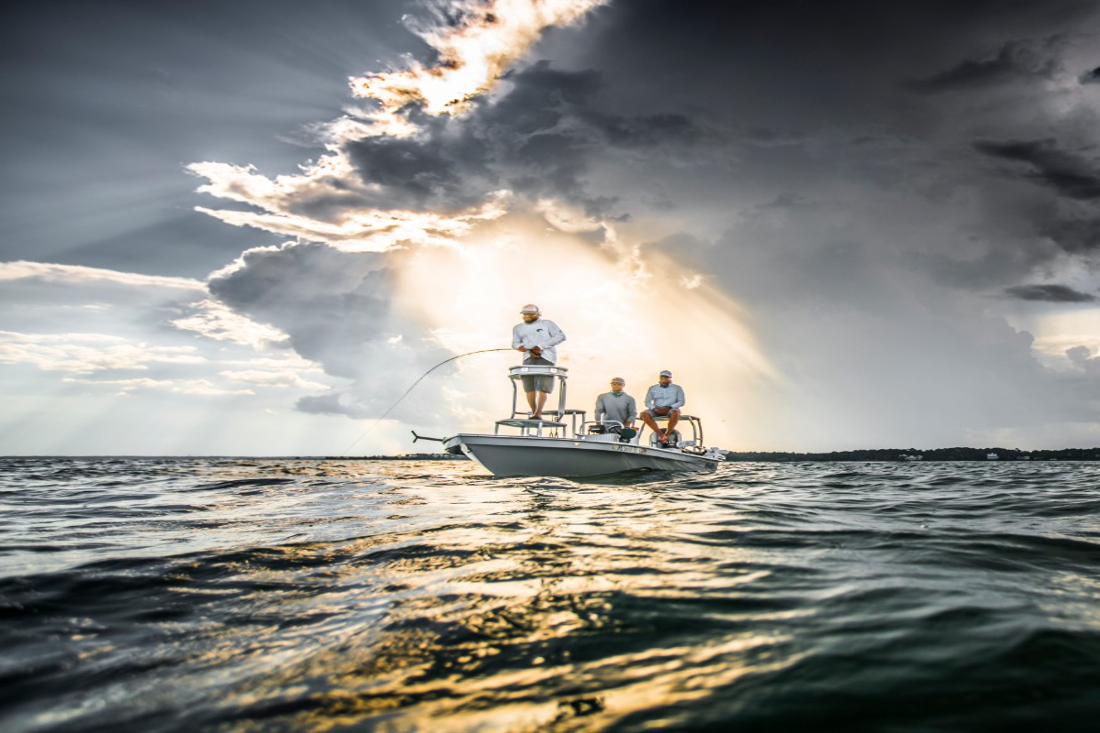
Photo Credit: Lauren Athalia
“I started fishing and exploring east of Panama City and we saw Tarpon. We saw them, and found them, but had no idea how to catch them. I remember going to the library to figure out anything I could. That was my education, I guess. This was way over 25 years ago and nobody was doing that. Nobody even knew what that fish was in this area. We’re known for grouper, snapper, stuff you can eat and kill, redneck stuff.”
Is David a redneck? I wonder, but he says, “No! Within certain circles I might say I’m a redneck, but all my redneck buddies think I’m pretty liberal. When they call me a liberal, I think they mean harm with that statement, but I don’t think I’m a redneck.”
Fishing friends call him ‘The Scientist.’ David says, “I’m way more analytical and I pay attention to all the little details others don’t. I pay attention to the velocity of the tide, water temperatures, barometric pressure, the direction of the wind, and over time you see patterns and learn things that way. Things are learned over the years. Repetition insures we get good at anything.”
“With any sport, anything you want to do well at, you are going to have to obsess that way. I have a journal I’ve kept since 2002 that I’ve written in every single day I’ve gone tarpon fishing.”
In talking with David it’s clear he is a man of strong beliefs and principles, driven by a set of rules and ideas which he is absolutely unwilling to bend. He is going to be the best. But he is going to do it the right way and on his terms.
“I probably wouldn’t have the relationship I have with this fish if I had to kill it. The fishing I do is still hunting. That’s built into us from thousands of years ago. We’re all hunters, but I love the fact that with fish, I can let it go again.
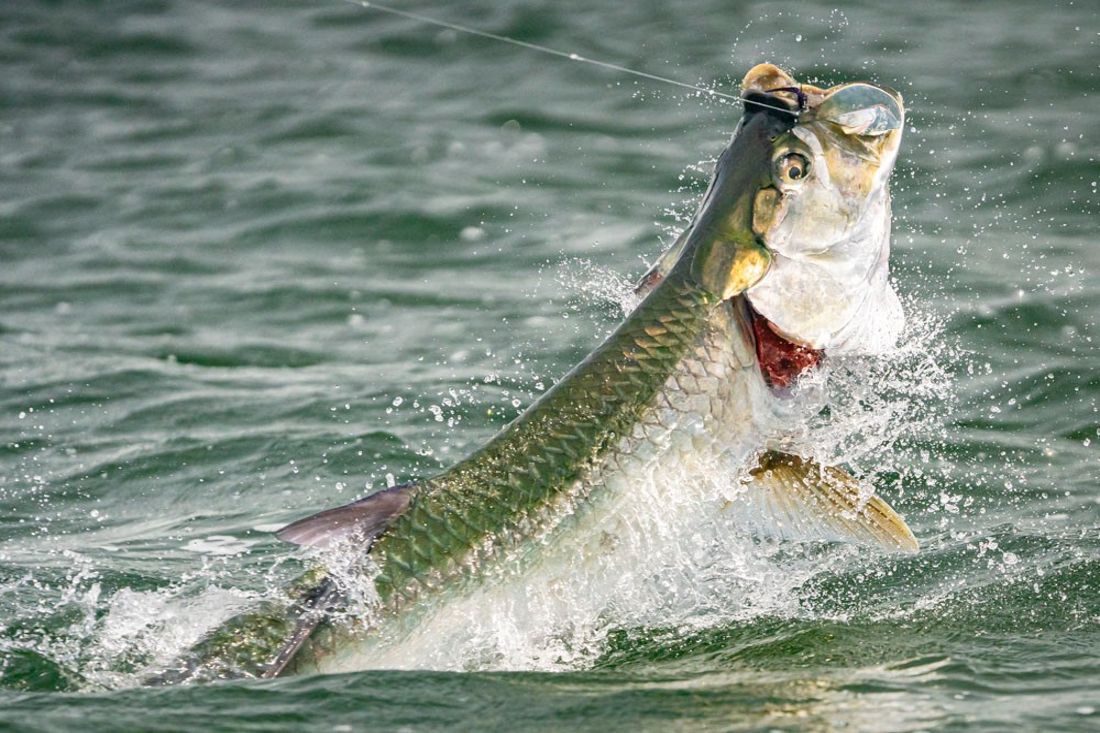
Photo Credit: Lauren Athalia
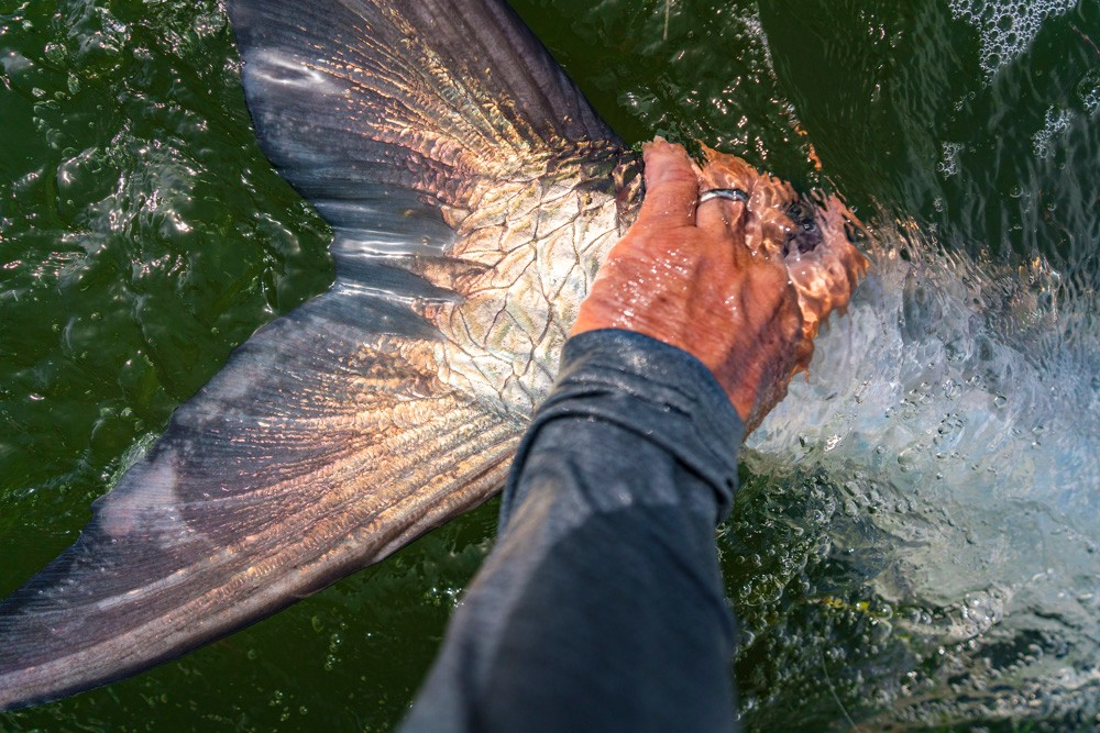
Photo Credit: Lauren Athalia
“A couple of years ago I caught one that was 215 lb . The world record is 202 lb, but to achieve that record I would have had to kill it. So forget that! I’ll never kill that fish. Why would I? The people I respect in the outdoor world will know about that catch in a matter of days anyway and be like, ‘hey, cool’.”
Sharing that accomplishment within that small circle is more than enough for me.”
And how do his clients relate to him? Many, who are wealthy people paying to go on the hunt, feel the same.
“I’m a Guide, I introduce folks to the fish and explain the them how to catch the fish. Probably 95% of fish we catch, we see first. I’ll show them the fish and they make their cast and try to catch it. Way cooler! I’d rather brag about what we did. It’s not about me, nobody cares, they know I can do it. It’s far harder and more skilled to guide my angler to a fish than catch it myself.”
David laments, “We have to manage expectations from when the client and I first speak. It takes years to figure that out, and learn how to speak with clients, so they’re laughing before they step on your boat.”
“The people who want to kill fish, are going to kill fish. I see them coming, with their white styrofoam cooler, from miles away Those are not our clients. We are going out for sport fishing, and we catch and release.”
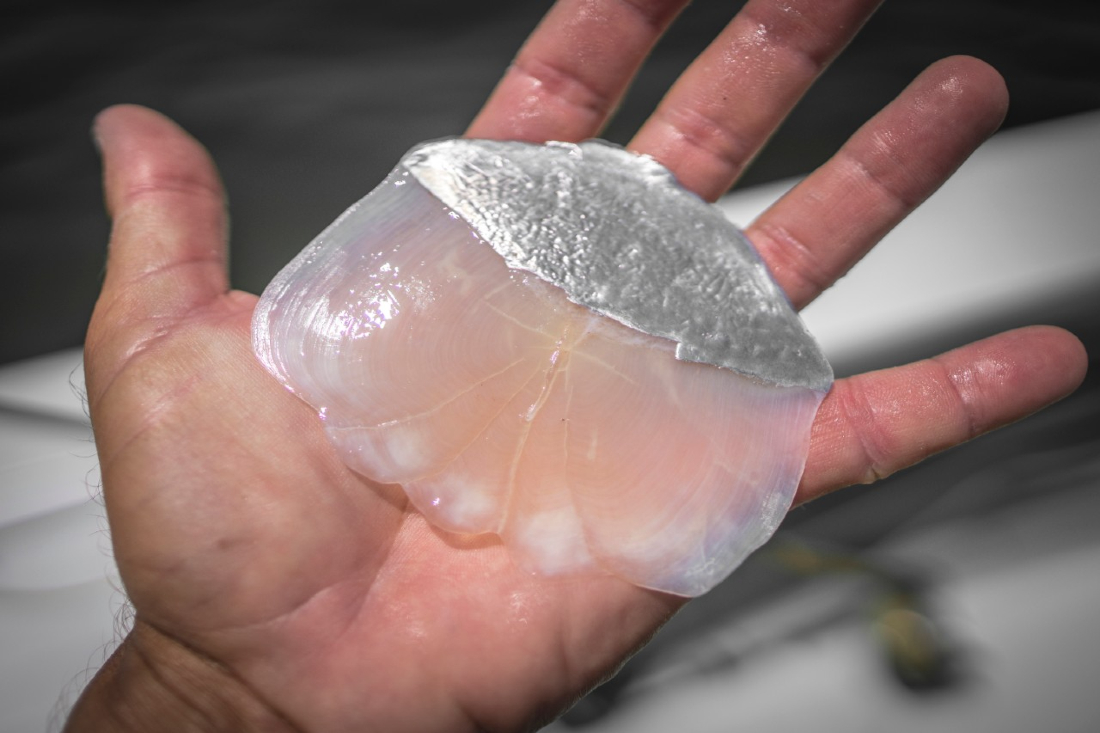
Game fishing today, especially along this stretch of Northwest Florida’s Gulf, is a big-money business. I wonder if a man is so driven by the process of learning by experience, years of watching and recalling the moves the big fish make, is worried about the money and technology available to others who haven’t ‘served their time’.
“It still takes work, there’s more resources to help figure it out, but there’s no substitute for time. You cannot cheat time, no way. Time spent is irreplaceable, but I embrace the technology if it gives me the edge.”
And woe the man who trespasses on his fishing spots, which are clearly identified with his trademark skull buoy anchor float.
“I won’t cheat off anyone else’s homework. That’s the ultimate rule in our industry. If someone takes the time to figure out a spot, then that’s theirs. When we hook a tarpon we’ll unclip the anchor and may be out of sight before we actually catch the fish. Guides will see the anchor buoy and say, “Ah, that’s where Mangum is fishing,” and leave. If they don’t, we’ll have issues. Every blue moon it happens, you can’t just figure that place out. Nobody just licked their finger, put it up to the wind, and decided to drive their boat to that one exact spot. Many people don’t care about learning it the right way, they just want to have the fish in front of them. They don’t care about the hunt, the search, they just want to put the photograph on social media. If you didn’t learn it the right way, and you’re just going to take it, or take it from someone else that earned it, in my world, that doesn’t work.“
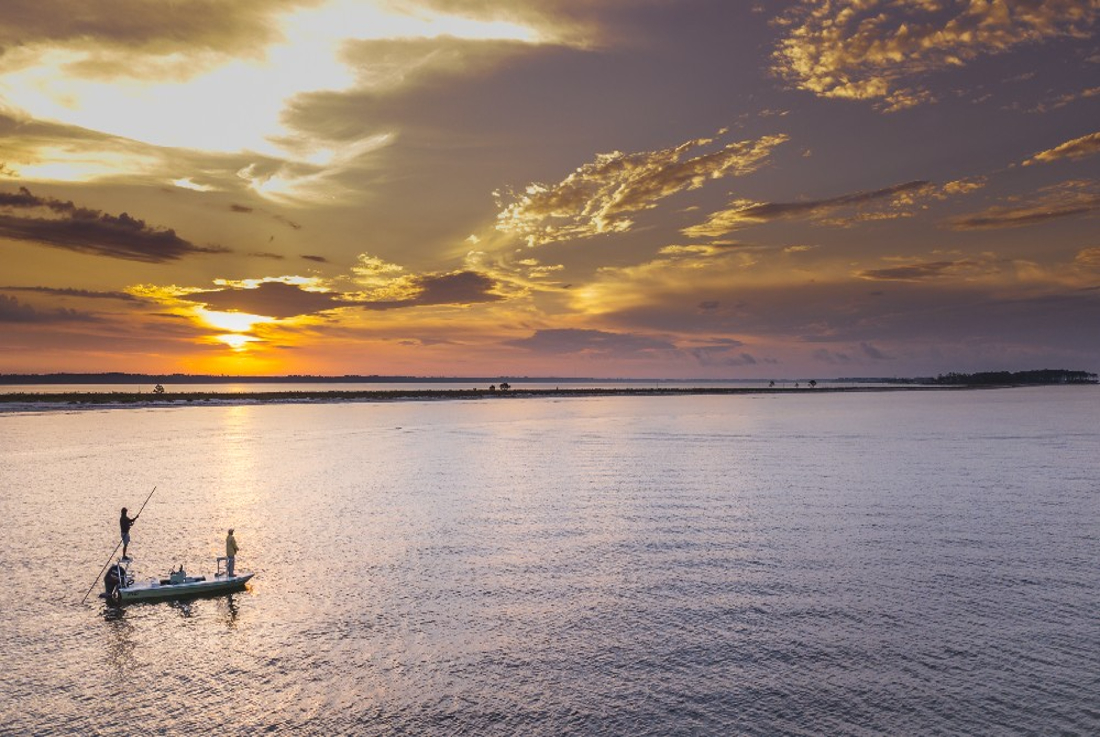
As for the future, David can see no reason not to carry on doing this for another 20 years. Mangun says, “The biggest inhibitor nowadays is that I’m 47 years old. My body says, ‘hey, guess what man, you’re not 20 anymore, but physical fitness is still something I prepare for every year before my Tarpon season. I just did a seven-day juice fast, cleaning out, cardio, and balance on my slackline, because I want to be the best I can, to wake up before the sun comes up and be out there all day every day.”
He goes on to say, “It’s my favorite thing in the whole world. Those days, those 120 days, it is work, but it’s not, and it’s hard. I love that, if it were easy, I wouldn’t care about it.”
Dedication. Passion. A Lifetime’s Pursuit for Perfection. For what? “I’m going to figure it all out before it’s over. I’m going to learn everything there possibly is to know about Tarpon on the Florida Gulf Coast. I want to know more than anyone else knows.”
And what has all this taught him?
Mangum says, “What I do is entertainment, and I want to keep that perspective. This isn’t a matter of life and death.”
“The main skill isn’t even fishing, rather connecting with somebody that you have a common passion with, making people comfortable. I love dealing with people and I hate it as well, sometimes. It just sort of happens. I meet somebody on the boat or at the ramp for the first time and we become friends. That human connection is a real thing and I still dig it”
And with a final smile, David Mangum looks at me and says, “Just don’t tell anybody.” BH




